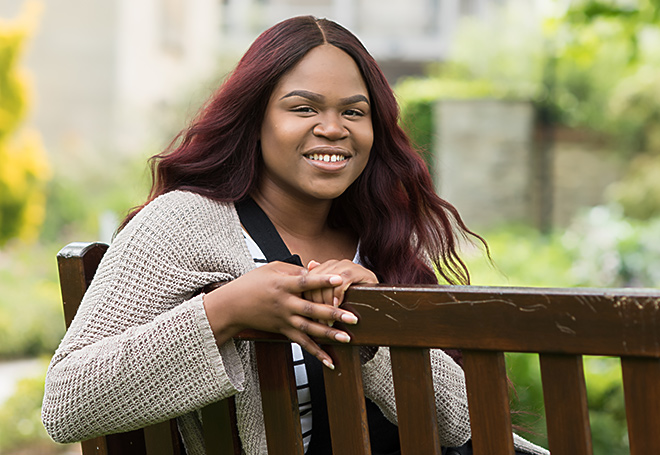With help from donors, Oxford is working to ensure that talented young people from all backgrounds have the opportunity to fulfil their academic potential.
After finding out that she had been accepted into Oxford, Fis Noibi called her family to tell them the good news. 'Everybody was screaming,' she recalls. 'Everybody except for mum. She wasn’t surprised at all; she said she always knew I would be going.'
Her mum may not have been surprised, but Fis certainly was. Now a fourth-year French and Arabic student, she was one of only two people from her secondary school to win a place at Oxford that year. 'My school wasn't very experienced with helping people get to Oxbridge. I think the last person before us went to Cambridge, but that was many years ago.'

For Fis, applying to Oxford felt like 'a foreign concept' at first. It was only in year 10, after meeting with a representative from Target Oxbridge, that she started to consider the possibility. Launched in 2012, Target Oxbridge aims to increase the number of black African and Caribbean students at Oxford and Cambridge by helping talented pupils to apply. 'But even then, I just couldn't decide if I really wanted to go,' she reflects. 'I didn't know if this was something I could be really serious about.'
In year 12, Fis won a place on the UNIQ summer school programme. Open to students studying at UK state schools, UNIQ offers a realistic view of Oxford life, with participants staying in colleges, attending lectures and tutorials, receiving application advice and engaging with top academics during their five-day stay. It's an experience she credits with helping her to make up her mind once and for all.
'Just being able to speak to people here and ask them questions about Oxford was amazing. That's when I really started to think, okay, I can actually see myself in this position,' she says. 'It also really helped to prepare me, not just for writing my personal statement and making an application, but for what to expect when I finally got here.'

Opening the door for others
A few days into Freshers' week, Fis started attending events run by the African and Caribbean Society (ACS), a student-led society that explores, promotes and celebrates African and Caribbean culture at Oxford. 'I knew that I would spend a lot of my time at the ACS because of my siblings' experiences at their universities. It played a big role in helping them to adjust and feel at home.
'I also knew that I wanted to be with people who look like me,' she continues. 'Just to know that they're here is really important.' Although the number of black and minority ethnic students at Oxford has grown in recent years, the University is working hard to increase diversity amongst its student population. Access and outreach initiatives, as well as partnerships with schools, student societies and other organisations, are key to speeding up the pace of change.
I'm not the type of person to just sit and complain about something. I like to make plans and take action.Fis Noibi
Supported by Oxford's Undergraduate Admissions and Outreach team, the ACS holds regular events aimed at helping prospective students of African and Caribbean heritage to make informed choices about their education. Fis, who served as the society's Senior Access and Outreach Officer last year, was responsible for coordinating their outreach efforts. 'You can really see the impact that our programmes are having,' she explains. 'When a student we’ve worked with goes on to make an application to Oxford, it's very rewarding.'
As well as volunteering for the ACS, Fis has also continued her involvement with the UNIQ programme. This time though, she is a student ambassador, responsible for supporting her very own group of cohorts. 'I'm doing all of this to help make a change,' she says. 'Yes, it's a big commitment, but it's worth it. I've made my way into this space, so it's important that I help others behind me to follow.'
UNIQ gives priority to students from low socio-economic status backgrounds and areas with low progression to higher education. It was established in 2009 through philanthropy, and will soon expand by over 50% thanks to another generous donation.